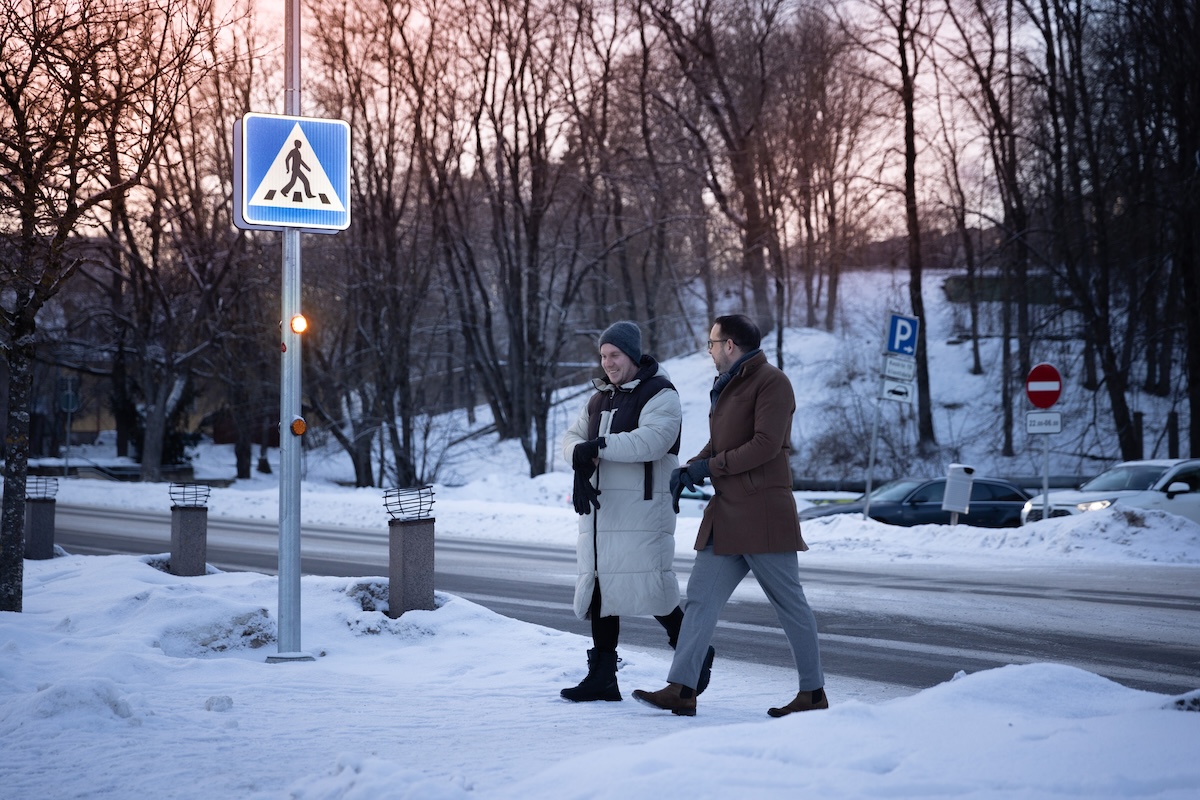on the 4th of January 2024, the Põlva Municipal Government and technology company Bercman Technologies announced the completion of the smart road constructed in the town of Põlva in southeastern Estonia. The Põlva smart road was built with the aim of increasing traffic safety and piloting an innovative solution for measuring urban average speeds, in conjunction with smart pedestrian crosswalks. The project was carried out and co-financed using funds from the European Regional Development Fund, under the measure ‘Enhancing the Local Socio-Economic Impact of R&D and Innovation Systems and Smart Specialization in Growth Areas (ICT + Health + Resources)’. The contract’s total cost, including VAT, was 167,980 euros, with 50% of the budget comprising a grant from Enterprise Estonia (EAS).
The Mayor of Põlva, Martti Rõigas, expressed great satisfaction with the completion of the smart road. “The innovation tender was initiated primarily with the objective of ensuring that every resident of Põlva feels safe while moving on the streets,” said Rõigas.
The head of the technology company that developed the solution, Mart Suurkask, also expressed contentment with the achievement and highlighted the global uniqueness of the Põlva smart road. “The small town of Põlva has taken a leading role in traffic safety innovation, and the solution we have developed is, to our knowledge, not in use anywhere else in the world,” stated Suurkask. He added: “Põlva is an excellent location for the smart road solution, as the town is traversed in its entirety by a main street with many pedestrian crossings, and a continuous flow of traffic through the town center.”
As part of the smart road project, the Bercman’s proprietary Smart Pedestrian Crosswalk safety system, equipped with traffic data collection capabilities, was installed on 14 unregulated pedestrian crossings along Kesk and Jaama streets in the center of Põlva. This includes partial equipping of the crosswalks with vehicle number recognition cameras for measuring average speed. Thus, a cost-effective, comprehensive solution for measuring average speed within the city was created.
The mayor of the municipality with 13,500 residents, Rõigas, emphasized that although it may sometimes seem that the traffic environment in Põlva town centre is already sufficiently safe, the data from the smart road solution also presents facts that offer a different perspective. “On the first day of the test period, we identified a vehicle that sped through the center of Põlva at a speed of 80 km/h,” the mayor highlighted as a concerning fact and added that this is not the only instance of detected speed limit violations.
The method of measuring average speed independently has been repeatedly researched and tested on highways around the world for traffic calming, accident prevention, and mitigation. “Based on previous practices, we see this as an effective method,” said Suurkask. He explained that for measuring average speed, the smart road is equipped with 10 number recognition cameras in both directions, distributed at five measuring points. Over the 2.5 km stretch, the time taken to traverse the section is calculated using data from the cameras at both ends. This information is then displayed to the driver, indicating whether the speed was within the legal limit or exceeded.
However, measuring average speed is just one aspect of the smart road solution, as the cameras are integrated into a comprehensive system with intelligent pedestrian crosswalks. These crossings signal with a light indication when a pedestrian is crossing and additionally collect anonymised statistics on traffic density, such as counting pedestrians crossing the road and vehicles passing through the crossings. The smart road is also equipped with a measurement point for collecting environmental data. This includes information on temperature and humidity, as well as more detailed data on air quality indicators like O3 and NO2 levels, and the concentration of particulate matter in the air.
The importance of the data collected by the smart road is specifically highlighted by the Mayor of Põlva. “The anonymised data collected by the devices will provide us a basis for making smarter decisions in the future,” stated Rõigas. He added, “The entire smart city concept is based on informed decisions made from data. With the smart road, we are taking a significant step towards more conscious planning.
According to the technology company’s updated data protection impact assessment in September 2023, the anonymised data collected via the smart pedestrian crosswalk devices do not pose a threat to individuals’ rights and freedoms.
The smart road was completed at the end of 2023, according to Mart Suurkask. “The pedestrian crosswalks detect pedestrians and alert drivers with LED lights, and the cameras measure the average speed of vehicles and collect anonymised traffic statistics,” stated Suurkask. He added that looking ahead, these crosswalks have the potential to integrate with V2X communication technologies, enhancing vehicle-infrastructure interaction.
The anonymised traffic statistics of the smart road can be viewed at the web address https://nutitee.bercman.com/nutitee-public
Bercman, founded in 2016, is a technology company listed on Nasdaq, specializing in development services, creation of proprietary products, and provision of comprehensive technology systems.
Põlva Municipality, in the southeastern Estonia, is renowned for its picturesque landscapes and vibrant cultural heritage. As the administrative center of Põlva County, it serves as a hub for regional development, combining historical traditions with modern advancements. This municipality is distinguished by its commitment to community well-being, environmental sustainability, and innovation.
Krakul is an Internet of Things, autonomous systems, and product development company that in late 2021 was acquired by Bercman Technologies.
Contact:
press@krakul.eu

